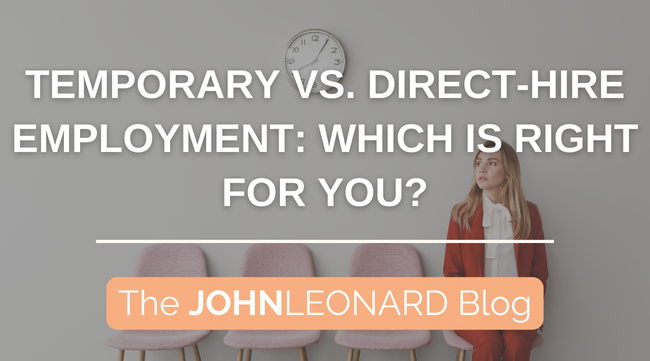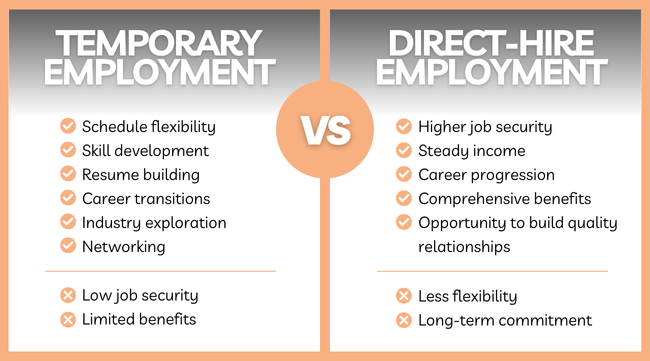
If you’re starting a new job search—whether it’s your first job, after a break from the workforce, or a career change—it’s crucial to assess which type of employment aligns best with your lifestyle and goals. Temporary and direct-hire jobs each offer distinct advantages and drawbacks based on your circumstances. Use this guide to decide the best fit for your current and future needs.
Temporary Employment
Temporary employment involves working a job for a limited time, often through a staffing agency or directly with an organization. It serves various purposes, such as supporting projects, covering employee absences, or filling interim vacancies.
Working temporary roles is great for:
- Schedule flexibility
- Skill development and resume building
- Career transitions and industry exploration
- Networking
There are many scenarios where temporary employment is a valuable option for any experience level. Everyone’s life circumstances are unique, and sometimes direct-hire employment may not be the best choice.
Here are some common situations where temporary employment can be beneficial:
- College breaks: Taking on temporary work while on summer and holiday breaks from college is a great way to network, upskill, build a resume, and make some extra money.
- Entering and reentering the workforce: For those who have been out of the workforce for some time or have yet to enter the workforce, temporary employment can be a great way to explore career opportunities, gain skills and experience, and ease into a new routine. Being open to temp work can be a great way to stay busy while job searching and may also lead to direct-hire employment.
- Laid off: Victims of layoffs often receive severance packages to help with the transition period, but that’s not always sufficient. Working temporary assignments is a great way to keep some income flowing, stay busy, and get your foot in the door with other organizations.
- Career pivot: Long-term work in one field can prompt a desire for a career change. Exploring new fields and industries through temporary roles can help one find what they like and dislike without a direct-hire commitment.
- Caregivers: Life’s uncertainties often require stepping back from work to care for ill family members or take on the role of a stay-at-home parent. Temporary work offers flexibility to caregivers, providing income and activity without the commitment of a direct hire role and enabling personal engagement.
- Supplement gig work: Gig workers, actors, artists, and musicians often have inconsistent schedules, mainly working nights and weekends. Temporary work supplements income to help fund their talents without sacrificing vital time.
While temporary employment has many pros, it’s not always going to be the best option, and it’s important to consider the downsides as well as the upsides.
- Low job security: Because temporary work is, well, temporary, there’s a higher risk of job security. While temp roles can sometimes be extended or lead to direct hire, they can also end abruptly and/or before the intended end date.
- Limited benefits: Temp roles will most often include some level of health insurance, holiday pay, and paid time off, but a certain number of hours worked must first be reached.
Direct-Hire Employment
Direct-hire employment is full-time or part-time, long-term employment with an organization where the employee and employer have an agreement via an employment contract or offer letter. Departure from a direct-hire role typically involves a two-week notice from an employee or a termination or layoff from an employer.
Direct-hire employment comes with many advantages, including:
- Higher job security
- Steady and growing income
- Career progression and development
- Comprehensive benefits (insurance, paid time off, retirement plans, etc.)
- Opportunity to build quality relationships and contribute to a positive culture
Just as temporary work has a list of pros and cons, direct-hire employment also has some critical factors to consider when determining which type of employment is best for you.
- Less flexibility: Securing a direct-hire position means working in that capacity for that employer for an indefinite period of time. If flexibility is important to you, temporary work might be ideal.
- Long-term commitment: When an employer hires a direct-hire employee, the expectation is that the individual will stay in that role long-term. It’s not uncommon for a direct-hire employee to be promoted or moved internally, but for those who thrive in various environments and like variety, direct-hire might not be the best fit.

In deciding between temporary and direct-hire employment, it’s essential to weigh the pros and cons against your unique lifestyle and career ambitions. Temporary roles are valuable for career exploration and transitions, while direct-hire positions appeal to those seeking long-term commitment and security. By assessing your priorities and goals, you can determine which type of employment aligns better with your current needs and future aspirations.
Before you go, be sure to subscribe to The JOHNLEONARD Blog and check out all our temporary and direct-hire jobs!
